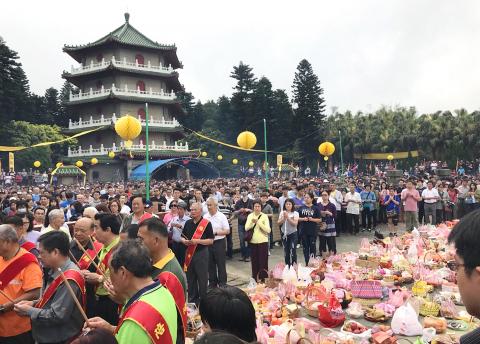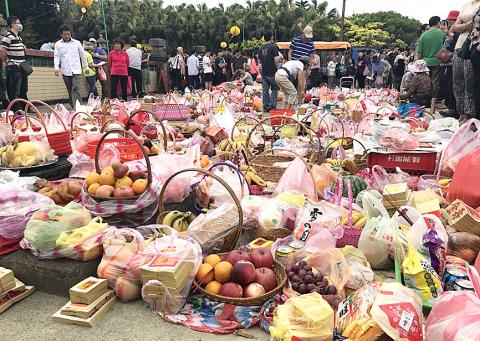More than 10,000 descendants of Yeh Chun-jih (葉春日) — a man who migrated to Taiwan in the 17th century — yesterday visited Yongsing Borough (永興) in Taoyuan’s Sinwu District (新屋) to worship their common ancestor on Tomb Sweeping Day.
The Yeh family’s ancestral ceremony has been passed down for 283 years to more than 15 generations and yesterday’s ceremony was attended by descendants from Taiwan, Southeast Asian nations, Brazil and the US, Yongsing Borough Warden Yeh Kuo-chieh (葉國傑) said.
It was the first time that some younger family members had participated in the ceremony and seen the strength of the ancestral lineage, Yeh Kuo-chieh said, adding that the ceremony helps children appreciate the significance of funeral rites and their common ancestry.

Photo: Lee Jung-ping, Taipei Times
The city government set up a temporary parking lot for the crowd and conducted traffic control, Taoyuan Mayor Cheng Wen-tsan (鄭文燦) said.
The city plans to build a parking lot near Yeh Chun-jih’s tomb to make transportation to and from the area more convenient, Cheng added.
Yeh Chun-jih arrived in Taiwan by sea with his son, Yeh Te-feng (葉特鳳), and settled in Sinwu District’s Danioulan area (大牛欄), Cheng said, adding that Yeh Te-feng had five sons; Ta-jung (大榮), Ta-hua (大華), Ta-fu (大富), Ta-kuei (大貴) and Ta-chun (大春).

Photo: Lee Jung-ping, Taipei Times
In Hoklo and Hakka, chun (春) is homonymic to yu (餘, surplus), he said.
Yeh Te-feng’s sons’ names are meant to remind future generations to have a surplus of health, time, virtue and wealth, in addition to their pursuit for money and power, Cheng said.
The careful attention that Taiwanese pay to the funeral rites of their ancestors can best be seen in the Yeh Chun-jih family ceremony, he said.

WAITING GAME: The US has so far only offered a ‘best rate tariff,’ which officials assume is about 15 percent, the same as Japan, a person familiar with the matter said Taiwan and the US have completed “technical consultations” regarding tariffs and a finalized rate is expected to be released soon, Executive Yuan spokeswoman Michelle Lee (李慧芝) told a news conference yesterday, as a 90-day pause on US President Donald Trump’s “reciprocal” tariffs is set to expire today. The two countries have reached a “certain degree of consensus” on issues such as tariffs, nontariff trade barriers, trade facilitation, supply chain resilience and economic security, Lee said. They also discussed opportunities for cooperation, investment and procurement, she said. A joint statement is still being negotiated and would be released once the US government has made

NEW GEAR: On top of the new Tien Kung IV air defense missiles, the military is expected to place orders for a new combat vehicle next year for delivery in 2028 Mass production of Tien Kung IV (Sky Bow IV) missiles is expected to start next year, with plans to order 122 pods, the Ministry of National Defense’s (MND) latest list of regulated military material showed. The document said that the armed forces would obtain 46 pods of the air defense missiles next year and 76 pods the year after that. The Tien Kung IV is designed to intercept cruise missiles and ballistic missiles to an altitude of 70km, compared with the 60km maximum altitude achieved by the Missile Segment Enhancement variant of PAC-3 systems. A defense source said yesterday that the number of

Authorities have detained three former Taiwan Semiconductor Manufacturing Co (TMSC, 台積電) employees on suspicion of compromising classified technology used in making 2-nanometer chips, the Taiwan High Prosecutors’ Office said yesterday. Prosecutors are holding a former TSMC engineer surnamed Chen (陳) and two recently sacked TSMC engineers, including one person surnamed Wu (吳) in detention with restricted communication, following an investigation launched on July 25, a statement said. The announcement came a day after Nikkei Asia reported on the technology theft in an exclusive story, saying TSMC had fired two workers for contravening data rules on advanced chipmaking technology. Two-nanometer wafers are the most

Taiwanese exports to the US are to be subject to a 20 percent tariff starting on Thursday next week, according to an executive order signed by US President Donald Trump yesterday. The 20 percent levy was the same as the tariffs imposed on Vietnam, Sri Lanka and Bangladesh by Trump. It was higher than the tariffs imposed on Japan, South Korea and the EU (15 percent), as well as those on the Philippines (19 percent). A Taiwan official with knowledge of the matter said it is a "phased" tariff rate, and negotiations would continue. "Once negotiations conclude, Taiwan will obtain a better